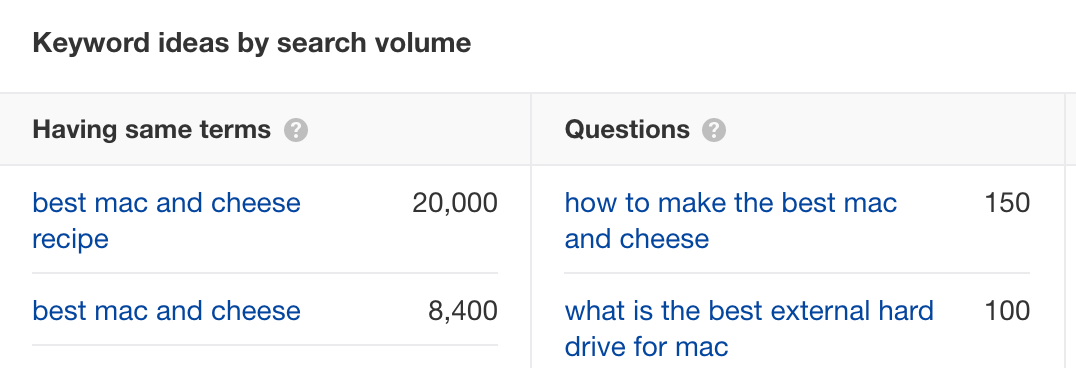You've never heard of me, but you've probably read my writing before.
Search for something like "best to do list app" or "problems with USB-C" and you'll see my byline. It's not a huge claim to fame, granted, but it keeps me employed—currently, at Zapier.
Blogging has been a big part of Zapier's marketing strategy since day one. We get a lot of traffic to the blog because we write helpful content about things people are searching for. A percentage of people who read our articles end up reading other articles on the site, and those articles teach them about what Zapier is and how it can improve their business and their work. A percentage of those readers end up using Zapier, and some of those people end up paying for a subscription.
You're probably wondering what any of this has to do with mac and cheese or Fleetwood Mac. Well, a lot of what I've spent my career writing about is Mac software. It turns out that articles about Mac software work particularly well for Zapier—the best Mac calendar apps, the best Mac email clients, that sort of thing. Because these articles seem to appeal to and help our readers, my editor asked me to write more of them. So I did some keyword research for "best mac." The results weren't what I expected.

"Best mac and cheese" is the most common "best mac" term, and "best Fleetwood Mac songs" comes in a close second. A normal person with my job would scroll past these results and write something relevant. I thought I'd write an article that outlined both things, while also explaining a bit more about Mac users and search engine optimization (SEO).
The best mac and cheese recipe
Have you ever Googled a recipe, clicked a result, only to find that you have to scroll past a 2,000-word story about the blogger's boyfriend's uncle's experience touring the Italian countryside? You might think this happens just to annoy you, specifically, but that's not (entirely) true.
Before I get into that, though, I'd like to tell you a story.
Back in 2009, I wrote for a content mill. I'd just moved to Colorado, right after a year doing local journalism in rural Alberta, and finding a job was impossible. Two major local newspapers had just shut down, meaning every position I applied for had several highly qualified applicants. I ended up writing for something called Demand Studios, making $15 per article writing tutorials about my secondary passion: software. I'd log in, see a list of article topics optimized for SEO, and end up writing five or six short articles a day. It paid the bills.
This was a big business at the time—at one point, Demand Studios was worth more than The New York Times. This despite the articles and videos being relatively, shall we say, light on actual content. Here's a famous example. There is no logical reason for that video to exist, but it does. Why? For a time, search engines served up short videos and articles like this when someone searched for "three cheese blend."
Over time, Google adjusted its algorithm, and now it tends to favor long-form content. Which is one reason why food blogs tend to include a personal story before getting to the actual recipe. Byrne Hobart, writing for OneZero, explains:
Recipes are a commodity; you can copy them as soon as you have the text. And Google's search engine algorithm penalizes sites whose content duplicates other sites while rewarding sites with original content and a trusted brand name. So the competition in recipes is to either be a beloved site with short blurbs, or be a less reputable site with longer ones.
You might want a recipe site that just includes recipes, but Google's algorithm means there's no money in making such a site anymore. And Google's decisions shape what sites can and can't exist in a very tangible way.
Remember Demand Studios? They eventually shut down entirely because of these changes. Short content doesn't rank in search engines anymore, meaning you can't stamp out $15 explainers and expect to rank highly. These same economic forces are why you have to read a long, meandering story before you can see the actual recipe you're looking for.
Which reminds me: you wanted the best mac and cheese recipe. My colleague Janine likes this one, and she's from Wisconsin, so I'm pretty sure it's the best one. Here's how to make the best mac and cheese: Simple stovetop macaroni and cheese (recipe courtesy America's Test Kitchen).
Why Mac articles work well for Zapier
Our Mac articles aren't our top performers in terms of page views—"best Mac calendar apps" gets a lot less traffic than "best calendar apps," for example. But Mac-specific articles consistently outperform Windows-specific ones, and people who read articles about Mac software are more likely to eventually use Zapier. Why is this? I can't say definitely, but I've got a few theories.
Mac users, obviously, are vastly outnumbered by Windows users—and they know it. This means that, if a Mac user searches for "best calendar apps," there's a good chance they'll find a number of Windows-only results. I, personally, tend to include "mac" in all of my software searches for exactly this reason. Windows users, meanwhile, don't bother doing this.
Mac users are also more particular about their software. They're more likely to want a dedicated, native application because an appreciation for such things is part of why they're Mac users in the first place. I try to keep this in mind while I'm writing about Mac software, and I'd like to think that's part of why these articles rank highly.
Finally, and I'm sure this isn't news to you, Macs cost more. This means that, on some level, Mac users are more likely to spend money on technology (or their company is), which means they're more likely to eventually pay for a product like Zapier if they find it valuable.
None of this is definitive, of course, but it all makes sense.
The best Fleetwood Mac songs
I'm not gonna lie—I don't like my odds for ranking on this one. The current top article is by Rolling Stone, which might be more of an authority on classic rock than Zapier. But I'm willing to give this a shot, so I asked my coworkers to vote for their favorite tracks. It's a very scientific process.
Here are the five best Fleetwood Mac songs, according to science:
Landslide
Everywhere
Dreams
Go Your Own Way
The Chain
Oh, by the way, here's how to create a poll in Slack, in case you want to do your own definitive ranking (adding links to my own articles can help them rank higher in search engines).
I can't believe you read all of that, especially if you ended up here after searching for music recommendations or mac and cheese recipes. But I'm grateful you did because I love this job and would like to keep doing it. Consider trying out Zapier while you're here—it's pretty good.





